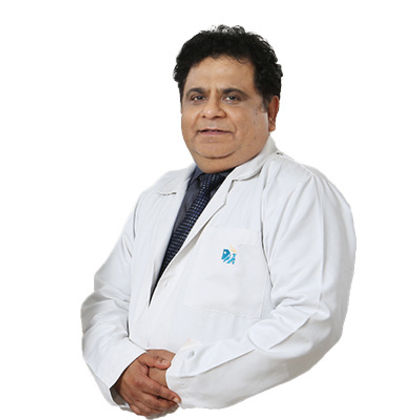Guide to Are You Suffering From Anxiety Disorder
Feeling overwhelmed or constantly on edge? Our comprehensive guide helps you understand the symptoms of anxiety disorder, provides self-assessment tools, and offers effective strategies for coping and finding professional help. Learn if you're suffering from anxiety and take the first step toward a calmer life.

Written by Dr. M L Ezhilarasan
Reviewed by Dr. D Bhanu Prakash MBBS, AFIH, Advanced certificate in critical care medicine, Fellowship in critical care medicine
Last updated on 13th Jan, 2026

Introduction
That knot in your stomach before a big meeting. The racing heart when you nearly have an accident. This is anxiety, and it’s a normal, hardwired human response to threat. But what happens when that feeling becomes a constant, unwelcome companion, showing up even when there's no clear danger? You might be suffering from an anxiety disorder. This condition goes beyond everyday worry, morphing into a pervasive force that can interfere with work, relationships, and daily life. The good news is that you are not alone, and these disorders are highly treatable. This guide will help you understand the signs, identify the different types of anxiety disorders, explore their causes, and outline the most effective paths to recovery and management. Let's unravel the question together: are you dealing with normal stress, or is it something more?
What exactly is an Anxiety Disorder?
An anxiety disorder is a specific mental health condition characterized by excessive, persistent, and often irrational worry and fear about everyday situations. Unlike the temporary anxiety felt before a public speech or a job interview, the feelings associated with an anxiety disorder are long-lasting—typically lasting six months or more—and can intensify over time.
Normal Anxiety vs. Anxiety Disorder: Knowing the Difference
The key differentiator is the proportionality and impact of the anxiety.
Normal Anxiety: Is proportional to the situation (e.g., nervous about an exam you didn't study for). It is short-lived and doesn't significantly impair your daily functioning. It might even be motivating.
Anxiety Disorder: Is disproportionate to the actual threat (e.g., intense fear about a casual social gathering). It is persistent, often feels uncontrollable, and leads to avoidance behaviors that disrupt your life, social activities, and job performance.
Common Types of Anxiety Disorders
Anxiety isn't a one-size-fits-all condition. It manifests in several specific forms.
Generalized Anxiety Disorder (GAD)
GAD involves chronic, exaggerated worrying about everyday life. People with GAD anticipate disaster and are overly concerned about health, money, family, or work, even when there is no apparent reason for concern. This "what-if" thinking is difficult to control.
Panic Disorder
This is characterized by recurrent, unexpected panic attacks—sudden surges of overwhelming fear and physical symptoms that peak within minutes. These can include heart palpitations, chest pain, shortness of breath, dizziness, and a feeling of impending doom. A common related fear is agoraphobia—avoiding places where escape might be difficult.
Social Anxiety Disorder
More than just shyness, this involves an intense fear of social or performance situations due to worries about embarrassment, humiliation, or being judged by others. It often leads to avoiding social gatherings, speaking up in meetings, or eating in public.
Specific Phobias
These are intense, irrational fears of a specific object or situation, such as heights (acrophobia), flying (aviophobia), or spiders (arachnophobia). The fear leads to active avoidance, which can be limiting depending on the phobia.
Recognizing the Symptoms: It's More Than Just Worry
Anxiety symptoms can be broadly categorized into emotional and physical, and it's the combination that often signals a disorder.
Emotional and Cognitive Symptoms
Excessive, ongoing worry and tension.
An unrealistic view of problems.
Restlessness or feeling "on-edge."
Irritability.
Difficulty concentrating or mind "going blank."
Anticipating the worst outcomes (catastrophizing).
Physical Symptoms of Anxiety
Often mistaken for other illnesses, the physical symptoms of anxiety are very real:
Heart Palpitations:
A pounding or racing heart.
Sweating and Trembling.
Shortness of Breath or a feeling of being smothered.
Chest Pain or discomfort.
Dizziness or lightheadedness.
Upset Stomach, nausea, or diarrhea.
Muscle Tension, aches, and headaches.
Fatigue and sleep disturbances (trouble falling or staying asleep).
Consult Top Specialists
What Causes Anxiety Disorders?
There's no single cause; rather, it's a complex interplay of factors.
Genetics and Brain Chemistry
Anxiety can run in families, suggesting a genetic vulnerability. Research also points to imbalances in neurotransmitters like serotonin and norepinephrine, which regulate mood and fear responses.
Environmental Triggers and Life Events
Traumatic or stressful events—such as abuse, the death of a loved one, divorce, changing jobs, or financial stress—can trigger the onset of an anxiety disorder. A history of trauma, especially in childhood, is a significant risk factor.
Personality and Medical Factors
Individuals with certain personality types are more prone to anxiety disorders. Underlying medical conditions, such as thyroid problems or heart arrhythmias, can also mimic or exacerbate anxiety symptoms.
How is an Anxiety Disorder Diagnosed?
There is no single lab test for anxiety. Diagnosis involves a comprehensive evaluation.
The Role of a Healthcare Professional
A doctor, often a primary care physician, psychiatrist, or psychologist, will conduct a thorough assessment. They will ask about your symptoms, medical history, and family history. They may also perform a physical exam or order blood tests to rule out other medical conditions that could be causing your physical symptoms (e.g., hyperthyroidism).
Questions You Might Be Asked
Be prepared to answer questions like:
"What are your symptoms, and how long have you had them?"
"How often do you feel anxious? Is it daily?"
"How much do these feelings interfere with your daily life?"
"Do you avoid certain situations because of your anxiety?"
"Have you experienced a recent traumatic event or major life change?"
If your symptoms are persistent and impacting your quality of life, it's crucial to consult a professional. You can book an online consultation with a psychiatrist or psychologist on Apollo 24|7 for a confidential and convenient initial assessment.
Effective Treatment Options for Anxiety
Anxiety disorders are highly treatable. Most people benefit from a combination of approaches.
Psychotherapy: Talking It Through
Cognitive Behavioral Therapy (CBT) is the gold standard. It helps you identify, challenge, and change negative thought patterns and behaviors that fuel your anxiety. Other effective therapies include exposure therapy (for phobias and PTSD) and acceptance and commitment therapy (ACT).
Medication: A Helping Hand
Several types of medications are used, often in conjunction with therapy. These include SSRIs (selective serotonin reuptake inhibitors), SNRIs, and sometimes benzodiazepines for short-term relief. A doctor can help determine if medication is right for you.
Holistic and Lifestyle Approaches
These are powerful complementary tools. Regular exercise is a proven anxiety reducer. Mindfulness, meditation, and yoga can help calm the nervous system. Ensuring adequate sleep and a balanced diet also plays a critical role in managing anxiety long-term.
Self-Help Strategies to Manage Anxiety Daily
While professional help is key, you can build a toolkit of strategies to use every day.
Breathing Techniques and Grounding Exercises
When anxiety strikes, your breathing becomes shallow. Practice diaphragmatic breathing: inhale slowly for 4 counts, hold for 2, and exhale slowly for 6 counts. Grounding techniques, like the 5-4-3-2-1 method (name 5 things you see, 4 you feel, 3 you hear, 2 you smell, 1 you taste), can pull you out of your thoughts and into the present moment.
The Power of Lifestyle: Sleep, Diet, and Exercise
Sleep: Prioritize 7-9 hours of quality sleep. Anxiety and poor sleep create a vicious cycle.
Diet: Limit caffeine and alcohol, which can trigger or worsen anxiety and panic attacks. Eat regular, balanced meals to keep blood sugar stable.
Exercise: Aim for 30 minutes of moderate exercise most days. It releases endorphins, which are natural mood lifters.
Consult Top Specialists
When to Seek Professional Help?
It's time to seek help when:
Your worry is causing significant distress or physical health problems.
Your anxiety is interfering with your work, relationships, or daily responsibilities.
You are avoiding situations due to fear.
You are using alcohol, drugs, or other substances to cope.
You have thoughts of suicide or self-harm (seek help immediately).
If your condition does not improve after trying self-help methods, or if it's significantly impacting your life, book a physical visit to a doctor with Apollo24|7. They can provide a full assessment and create a personalized treatment plan tailored to your needs.
Conclusion
Living with an untreated anxiety disorder can feel like being trapped in a storm of your own thoughts and physical sensations. But as we've explored, this condition is not a life sentence. It is a manageable and treatable part of the human experience. Recognizing the signs—whether it's the constant hum of worry from GAD or the terrifying surge of a panic attack—is the courageous first step toward taking back control. From evidence-based therapies like CBT to simple daily practices like mindful breathing, a multitude of tools exists to calm the storm. Remember, seeking help is a sign of strength, not weakness. You deserve to live a life not dictated by fear. Take the insights from this guide, be kind to yourself, and take that next step toward a calmer, more peaceful future.
Consult Top Specialists

Dr. Vasanthasree Nair
General Practitioner
15 Years • MBBS
Angamaly
Apollo 24|7 Clinic - Kerala, Angamaly
(525+ Patients)

Dr. Shaik Abdul Kalam
General Practitioner
3 Years • MD (Physician)
Visakhapatnam
Apollo 24|7 Clinic - Andhra Pradesh, Visakhapatnam
(175+ Patients)

Dr D M Karthik
General Practitioner
4 Years • MBBS, Fellowship in Diabetes Mellitus, Advance certificate in Diabetes Mellitus, Derma Nutrition Certification
Visakhapatnam
Apollo 24|7 Clinic - Andhra Pradesh, Visakhapatnam

Dr. Rajib Ghose
General Physician/ Internal Medicine Specialist
25 Years • MBBS
East Midnapore
VIVEKANANDA SEBA SADAN, East Midnapore

Dr. Anand Misra
General Physician/ Internal Medicine Specialist
14 Years • MBBS, DNB
Mumbai
Apollo Hospitals CBD Belapur, Mumbai




